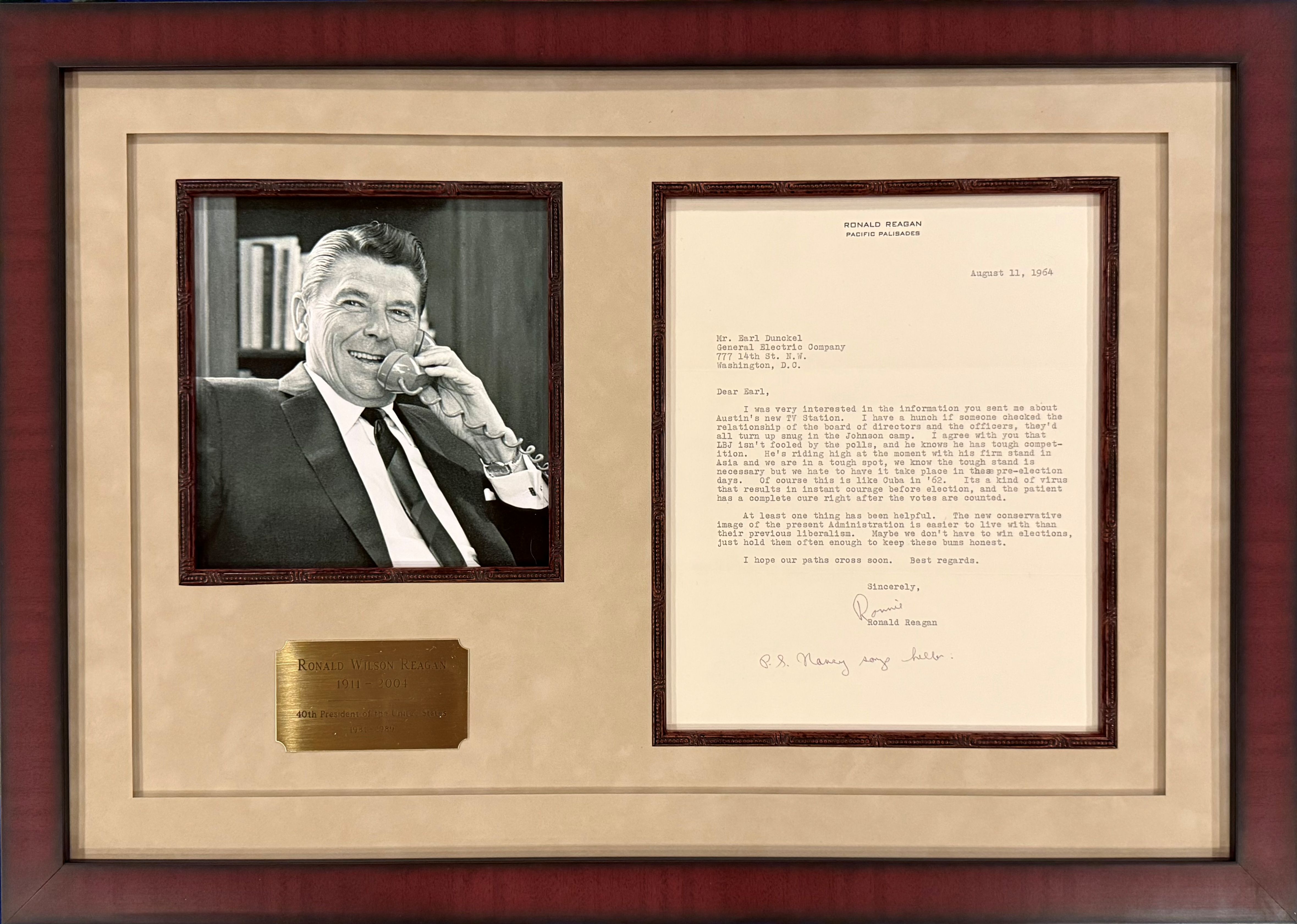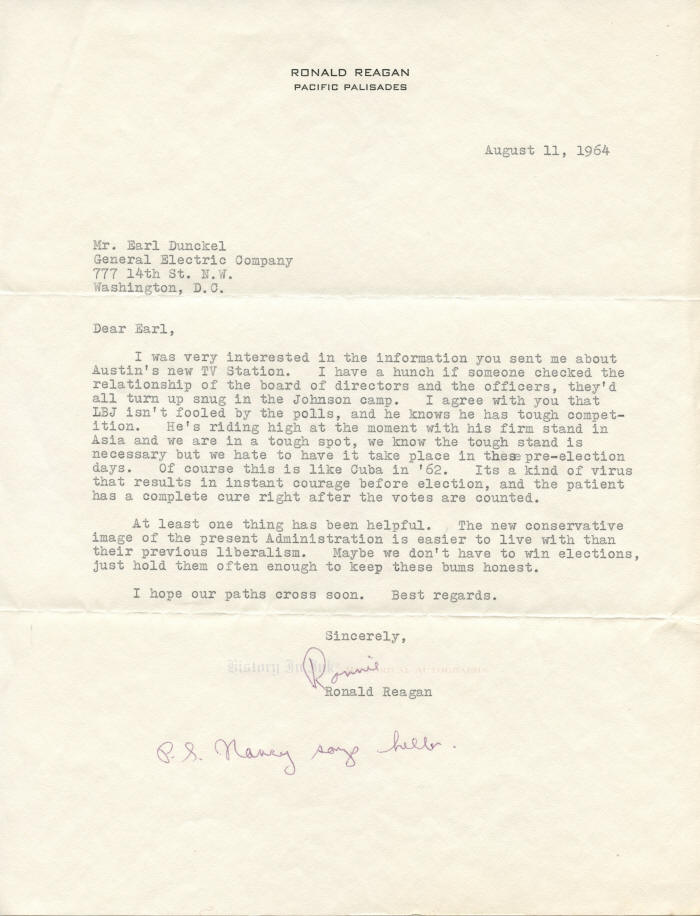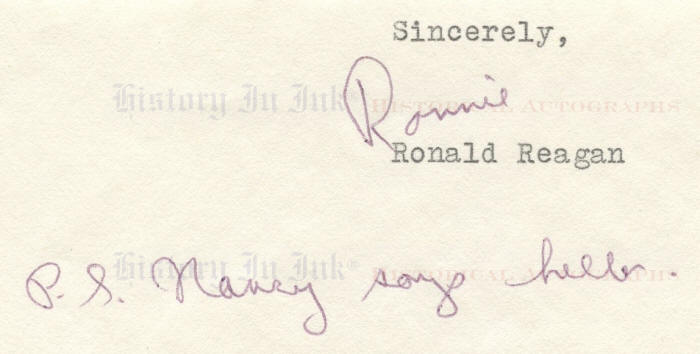


2105801
Ronald Reagan
Reagan on Lyndon B. Johnson’s “conservative image” through the use of force in Vietnam:
“Maybe we don’t have to win elections, just hold them often enough to keep these bums honest.”
Ronald Wilson Reagan, 1911–2004. 40th President of the United States, 1981–1989. Typed Letter Signed, Ronnie, one page, 7¼” x 10½”, on personal stationery, Pacific Palisades, [California], August 11, 1964. With autograph postscript.
In this outstanding political letter, written the day after the Gulf of Tonkin Resolution gave President Lyndon B. Johnson unlimited military authority against the North Vietnamese, Reagan discusses Johnson’s new, tougher stance in Vietnam. He acknowledges Johnson’s need for a strong hand in Vietnam and recognizes that his toughness will make things difficult for the Republicans in the upcoming 1964 presidential election. Still, Reagan suggests, it all might be political posturing that would disappear after the election. For good measure, he also discusses Johnson’s possible connection to a new television station in Austin, Texas.
Writing to Earl Dunckel, the person most responsible for turning him into a Republican, Reagan says, in full:
I was interested in the information you sent me about Austin’s new TV station. I have a hunch if someone checked the relationship of the board of directors and the officers, they’d all turn up snug in the Johnson camp. I agree with you that LBJ isn’t fooled by the polls, and he knows he has tough competition. He’s riding high at the moment with his firm stand in Asia and we are in a tough spot, we know the tough stand is necessary but we hate to have it take place in these pre-election days. Of course this is like Cuba in ’62. Its [sic] a kind of virus that results in instant courage before election, and the patient has a complete cure right after the votes are counted.
At least one thing has been helpful. The new conservative image of the present Administration is easier to live with than their previous liberalism. Maybe we don’t have to win elections, just hold them often enough to keep these bums honest.
I hope our paths cross soon. Best regards.
In a handwritten postscript, Reagan adds, “P.S. Nancy says hello.”
On August 2, 1964, nine days before Reagan wrote this letter, North Vietnamese torpedo boats attacked the USS Maddox, an American destroyer, in international waters in the Gulf of Tonkin. The ship was clandestinely conducting electronic surveillance against North Vietnam in order to aid South Vietnamese Army commando raids on North Vietnamese targets. Two days later, on August 4, the commander of the Maddox radioed that the ship was “under continuous torpedo attack,” and another American ship, the USS Turner Joy, reported that it was also under enemy fire. Secretary of Defense Robert McNamara told Johnson that American covert actions had provoked the North Vietnamese, but he did not tell Johnson that the captain of the Maddox later hedged by saying that “freak weather effects” on the ship’s radar and “overeager” sonar operators “may have accounted for many reports” of the second day’s attacks. Although historians later concluded that the August 4 incident never occurred, hindsight was too late.
Johnson ordered retaliatory bombing of North Vietnamese naval installations. He delivered a televised Oval Office address on August 4, and he reported to Congress on August 5 what he called North Vietnam’s “deliberate attacks” on U.S. naval vessels. He proposed a congressional joint resolution—which became known as the Gulf of Tonkin Resolution—“expressing the unity and determination of the United States in supporting freedom and in protecting peace in southeast Asia.” On August 7, Congress quickly adopted the resolution by overwhelming majorities in both the Senate, 88–2, and the House of Representatives, 416–0.
The resolution authorized the President, as Commander in Chief, “to take all necessary measures to repel any armed attack against the forces of the United States” and “to prevent any further aggression.” Because the United States deemed “vital to its national interest and to world peace the maintenance of international peace and security in southeast Asia,” the resolution said, the United States was “prepared, as the President determines, to take all necessary steps, including the use of armed force, to assist any member or protocol state of the Southeast Asia Collective Defense Treaty requesting assistance in defense of its freedom.” Pub. L. No. 88-408, 78 Stat. 384.
The resolution gave Johnson the constitutional authority to conduct an undeclared war and effectively gave him carte blanche in the use of personnel, materiel, and strategy.
Johnson signed the resolution on August 10. Reagan wrote this letter the next day.
This letter shows that Reagan saw the issue to be as much political as military. Johnson, he writes, was not “fooled by the polls” showing him with a large lead over the Republican presidential nominee, Arizona Senator Barry Goldwater, but instead knew that he had “tough competition.” It was unfortunate, he writes, that Johnson’s “firm stand in Asia,” although “necessary,” had to “take place in these pre-election days,” because it would put the Republicans “in a tough spot” politically. Indeed, Goldwater had voted for the resolution. Johnson had reported to Americans that he had spoken with Goldwater, who he said “expressed his support” of Johnson’s statement in his televised address.
Reagan compared Johnson’s firmer stand in Vietnam with President John F. Kennedy’s resolve against the Soviet Union in the 1962 Cuban Missile Crisis, which Reagan evidently thought withered after the American 1962 mid-term election. This “kind of virus,” Reagan writes, “results in instant courage before election,” but then “the patient has a complete cure right after the votes are counted.” It was an extraordinary statement. But history shows that once tensions cooled with the Soviet Union’s agreement to withdraw its offensive nuclear missiles from Cuba, Kennedy struggled with the aftermath. The Soviets nevertheless maintained bombers and troops in Cuba, and CIA Director John McCone warned Kennedy and former President Dwight D. Eisenhower that the United States would always have a problem with missiles in Cuba. See generally David G. Coleman, The Fourteenth Day: JFK and the Aftermath of the Cuban Missile Crisis (2012).
Still, the optimist Reagan saw a silver lining in the cloud: It was, he says, easier to live with the Johnson Administration’s “new conservative image” than with its “previous liberalism.” Thus his comment that the Republicans might not “have to win elections” but instead “just hold them often enough to keep these bums honest.”
Reagan seems to have misjudged Johnson’s resolve in South Vietnam. Although Johnson had said in his televised address that the American response to the attacks on American ships would be “limited and fitting” and that the United States sought “no wider war”—and although he reiterated the latter comment in his message to Congress—by the end of 1965 he had vastly escalated American involvement, given the recognition that South Vietnam was powerless by itself to stop the North Vietnamese takeover. While the United States had 23,310 troops in South Vietnam at the end of 1964, it would have 184,314 there by the end of 1965 and 485,300 by the end of 1966.
Reagan’s comment about the new television station in Austin, Texas—a competitor with the Johnsons’ station—senses a relationship with Johnson that, at least according to the press, did not exist. The Johnsons’ company, Texas Broadcasting Company, owned what until then was the only television station in Austin, KTBC-TV. Lady Bird Johnson had bought it in 1952 with money from her family inheritance. She would become a millionaire in her own right, the first First Lady to do so, through her ownership of the station and its affiliated radio station, KTBC radio. Of course, the monopoly helped LBJ politically. After Johnson became President, journalists questioned whether, as Vice President and then as President, he had exercised improper influence on behalf of the station. Although the Johnsons put the companies into a trust during Johnson’s presidency, still the Republicans made the monopoly a major issue during the 1964 campaign, criticizing Johnson for retaining a link to a business that the government supervised.
In June 1964, the FCC granted initial approval to another company, Southwest Republic Corporation, to build a second station, KHFI-TV, in Austin. Final approval came in September. Southwest Republic’s president was John Kingsbury, the finance chairman of the Republican Executive Committee in Travis County, Texas, one of the counties in which Austin is located. The company was owned by a group of prominent Republicans and conservative Democrats who supported Goldwater, and the promotion and sales manager for the new station was an active Republican party worker in Austin. Johnson Station Getting a Rival; A New TV Outlet in Austin is Approved by F.C.C., N.Y. Times, Sept. 24, 1964, at 31. Thus, Reagan seems to have been wrong in his speculation that Southwest Republic’s directors and officers would “all turn up snug in the Johnson camp.”
The recipient of this letter, Earl Bond Dunckel (1918–2002), was Reagan’s friend and colleague from his days as the host of General Electric Theater. Reagan hosted the CBS television show from 1954 to 1961 and worked as a motivational speaker for General Electric. Dunckel, a public relations consultant for G.E., became close to Reagan as the two toured G.E. facilities across the country together. After General Electric Theater, Dunckel, a member of the National Press Club, kept in contact with Reagan and frequently sent him information that he thought might aid Reagan politically.
Reagan has signed this letter in black ballpoint pen. The letter has two normal mailing folds and shows a bit of handling. It is in fine condition. It has been double matted in tan suede with a photograph of Reagan, an inlaid sculpted brown wood fillet, and a brass engraved identification plate. It is framed in a brown-and-black period looking wood frame to an overall size of 16½” x 23¼”.
_____________
This item has been sold, but
click here to see other
Presidents and First Ladies items
that we are offering



